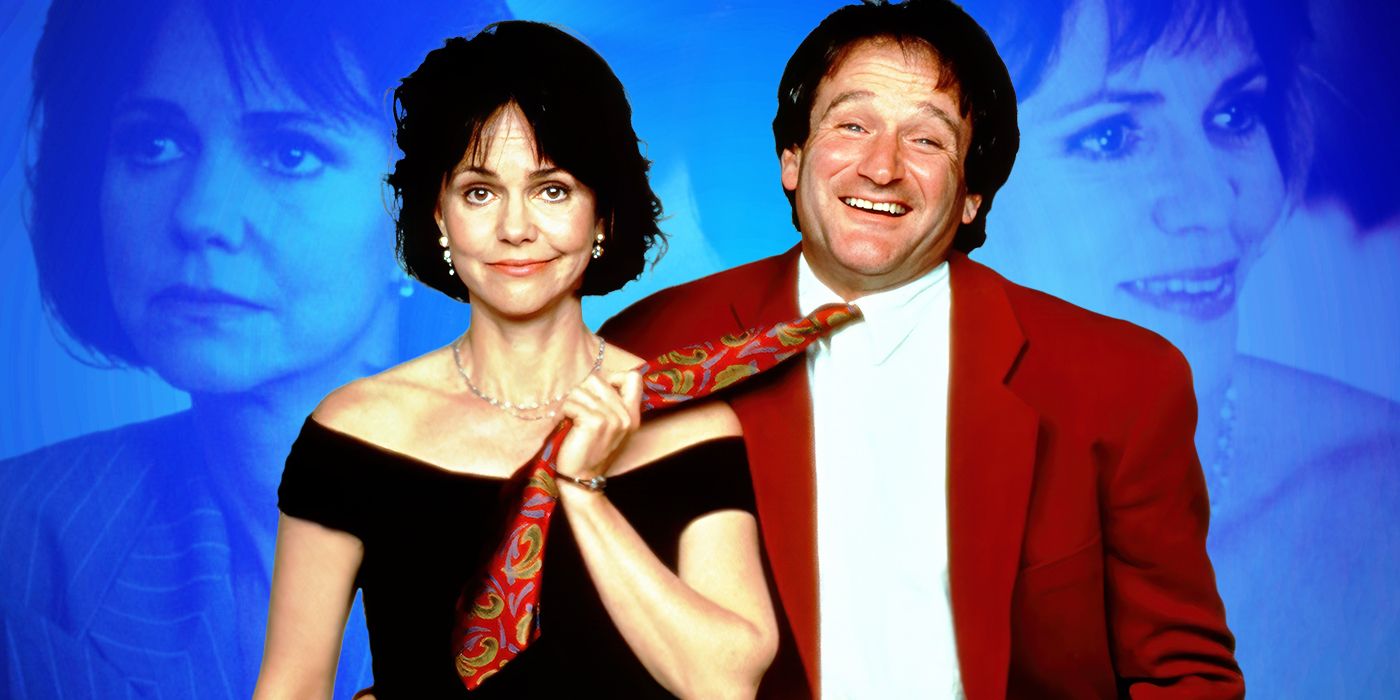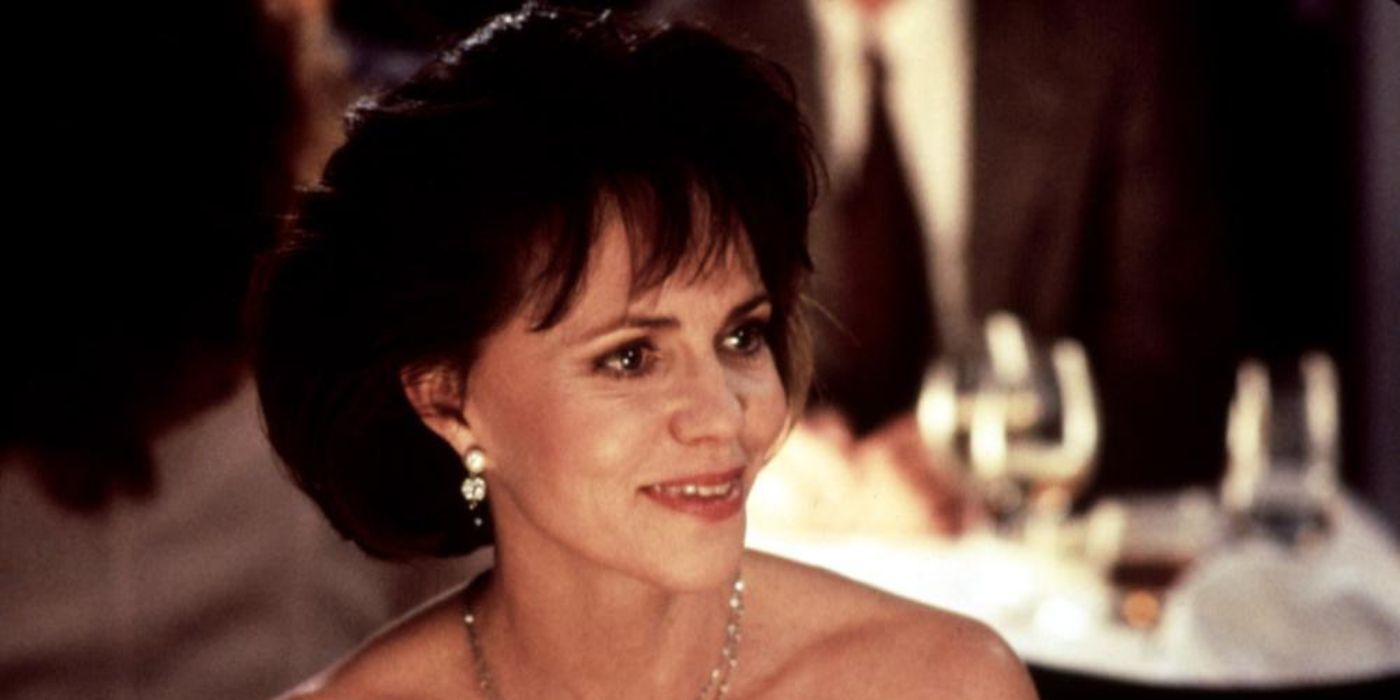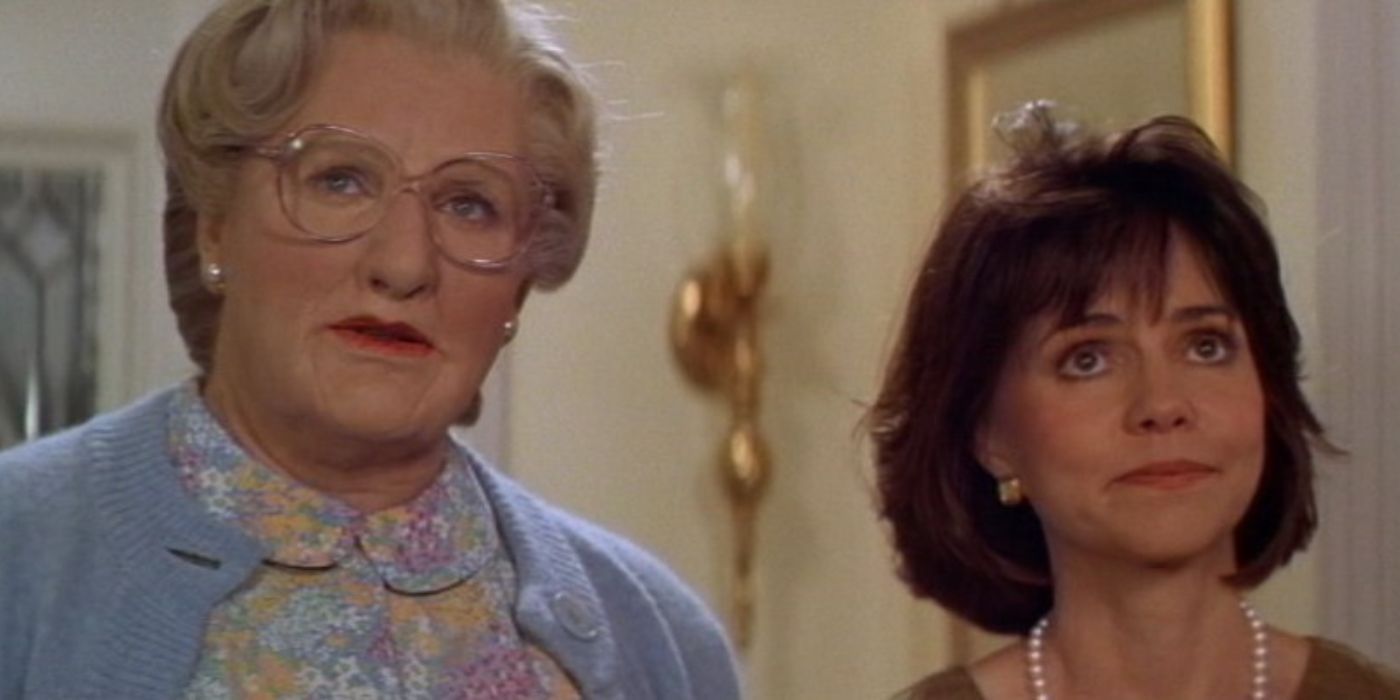Robin Williams and his antics are, without a doubt, what propelled Mrs. Doubtfire to make so much money way back in 1993 (219 million domestically and over 441 million worldwide). But even though Robin Williams gives an iconic performance in Mrs. Doubtfire, what viewers don't often realize is that Sally Field's Miranda was the actual protagonist of the film — and without her grounded, sympathetic portrayal, Mrs. Doubtfire wouldn’t have been as well-received or enduring.
Miranda Is a Character In Her Own Right in 'Mrs. Doubtfire'
Miranda Hillard is a successful career woman with three children she adores — Lydia (Lisa Jakub), Chris (Matthew Lawrence), and Nattie (Mara WIlson), — and Daniel (Williams), a husband of 14 years whom she tolerates. Daniel finally pushes her over the edge with a one-two shot of abruptly quitting his job one day and throwing a huge birthday party for their 12-year-old son, a party she’s not even invited to, which leaves their home a mess. Miranda makes the very hard, but very right choice to seek divorce. Miranda just can't continue being the parent to four children when she only has three. This is obviously where the "Mrs. Doubtfire" part comes in, as Daniel can’t accept reality and has to fabricate a way back to his old life by means of creating an elderly British nanny — at least that's what happens in this cinematic version of the 1987 novel, Alias Madame Doubtfire.
Marriage is supposed to be a partnership, after all, but it’s clear that this hasn’t been the case for a good long while. Even eldest daughter Lydia has noticed enough to start acting as a secondary parent to her younger siblings (case in point: the way she checks in with Chris about how he did on a test, or asks Nattie how her day at school was), which is maybe her way of trying to fill in the cracks of her parents’ marriage to avoid further conflict.
Considering Mrs. Doubtfire is first and foremost a comedy vehicle for Robin Williams, it could easily have left Miranda as an irritant who’s only around to bother Daniel and get in the way of fun. But Miranda gets to be her own person right from the start of the film, thankfully, and she’s clearly portrayed as a loving and hard-working mother, always thinking of her children when she tries bringing home some presents and cake on her way home from the office. She’s no saint, though, as cutting hours out of Daniel’s time with the kids on any given day and vocally disparaging everything about his new apartment in front of the children have an element of purposeful vindictiveness to them — but she is only human. Those varying characteristics, positive and negative, are what make her a fully formed protagonist in her own right. She isn’t some evil witch who ruined everyone’s life, nor is she a bland and always understanding cipher of a person who only exists to be “Good Parent” to Daniel’s “Bad Parent” for his character arc.
'Mrs. Doubtfire' Doesn't Have Villains — And That's a Good Thing
In fact, nobody in Mrs. Doubtfire is really portrayed as a villain or antagonist for being obstacles to Daniel’s wants and desires — not Miranda, not Stu (Pierce Brosnan), not the judge who oversees the custody hearings (who is definitely old-fashioned, but not evil), or Daniel's court liaison, not anybody. Everybody in Mrs. Doubtfire is entirely reasonable and understanding, constantly putting the three kids first, or at least doing what they think is right for the children. They might not be fun people, but that’s mostly because they’re just trying to do their jobs and Daniel is the only one living in such a heightened, silly world of his own making. As for Stu, some might argue with the fact that Miranda’s arc involves going from one man to another, but an argument could be made that she already knew who she was as a person and mother — she had a successful career that was her own, and the only thing she really wanted was a life partner who could help her achieve future goals as opposed to being an obstacle in her way. (Or, at the very least, she just wanted a chance to have a good time with a future Bond, James Bond.)
In Miranda’s defense as to how she could be unaware her ex-husband of 14 years was standing in front of her everyday as Mrs. Doubtfire — who would ever expect that?! She acknowledges an unexplained familiarity with Mrs. Doubtfire almost immediately, but there was no way she ever considered the idea that Daniel would create a fake old British lady from scratch instead of just waiting three months and filing for joint custody. From Miranda’s perspective, she’s living a dramedy about a newly divorced mother of three who gets a second chance at the one who got away. In a nice touch, by the end of Mrs. Doubtfire, there’s no specific indication that Stu is now a fixture of their lives. He isn’t Miranda’s future or her light at the end of the tunnel, he’s just a feature of new independence from the husband she is no longer in love with.
Miranda Has a Protagonist's Arc in 'Mrs. Doubtfire'
None of this is to say Daniel is a horrible person in Mrs. Doubtfire, by the way. Daniel and Miranda were simply two people in a rut, only he didn’t know he was in one, and Miranda had to be the person to say things needed a change. It’s clear, based on one of her conversations with Mrs. Doubtfire, that Miranda never really told Daniel about the depth of her unhappiness, but it’s also clear that Daniel never thought about it enough to ask. He couldn’t see a perspective other than his own until he was forced to, and those different perspectives, from everyone involved, are surely a huge reason why Mrs. Doubtfire managed to click with audiences so well. Moms could sympathize with Miranda’s plight, dads could understand Daniel’s point of view (or imagine they were the Pierce Brosnan of the situation), and kids had several different ages of children to see themselves in. Broad City’s excellent stealth homage to the film’s outlandish restaurant climax, featuring a rare cameo from a Mrs. Doubtfire movie alum, goes to show how Mrs. Doubtfire manages to be one of those enduring “fun for all ages” kinds of movies that stuck with generations of children and will live on as long as children of divorce exist.
The whole emotional resolution to the story, post-restaurant reveal that Mrs. Doubtfire doesn’t actually exist, is also entirely due to Miranda’s humanity and understanding. She was furious for a little while, understandably, but she decides her children’s happiness is more important than her frustrations with Daniel, and she arranges, through some off-screen movie magic, to pretty much fix everything. Miranda gets the story started, makes her own choices throughout, grows as a person, and then resolves the main conflict by her own hand. If those aren’t the actions of a protagonist in charge of her own story, then “protagonist” needs to be redefined.



